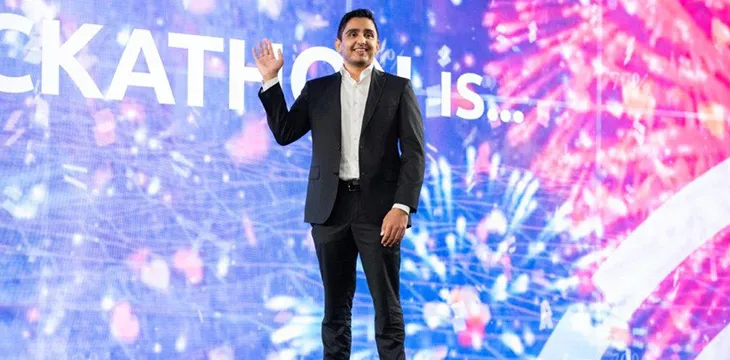|
Getting your Trinity Audio player ready...
|
Three projects – CATN8, TKS Pnt and Bitcoin Phone – were competing for the biggest share of the Hackathon’s $100,000 prize pool at CoinGeek New York earlier this month.
TKS Pnt was awarded second place with a prize of $30,000, while CATN8 took home third and a $20,000 prize for their Hackathon project.
The winner, Bitcoin Phone, is a project created by Canadian developer Joe Thomas which aims to bring dynamic transactions and real-time network communication to the BSV blockchain. Thomas’s solution is the world’s first voice-over-Bitcoin protocol, which can broadcast voice data over the Bitcoin network by leveraging the non-finality of nSequence to enable close to real-time data streaming.
The potential applications of the Bitcoin Phone protocol were fleshed out and explored in Thomas’s presentation to the Hackathon judges at CoinGeek New York. During the presentation, he showed how this protocol and its intrinsic link to Bitcoin micropayments could revolutionise the tutoring and language services industry by allowing tutors to compete on the price of their services and be paid instantly without navigating the roadblocks present in the current Internet-based platforms that cater to this industry.
The 4th BSV Hackathon comprised a six-week coding round, during which participants were tasked with creating an application or service that leveraged the ‘peer-to-peer’ capabilities of the BSV blockchain. Thomas’s solution was unique in that it leveraged the non-finality of the nSequence attribute in Bitcoin transactions to enable dynamic communication – something that fulfilled the requirement of the Hackathon problem in an unexpected way.
‘I’ve been in the space for a while – I switched to Bitcoin SV in 2018. One day, everything just clicked with how Bitcoin could absorb the Internet.’
Thomas’s Hackathon submission was a minimum viable product that demonstrated real-time voice communication on the BSV blockchain, using payment channels and on-chain transactions. The protocol wraps voice data in a non-finalised Bitcoin transaction that is then broadcasted to the network. Listeners use a bloom filter set to receive the data, unwrap the transaction and play the audio data directly through their speakers.
Along with the code and explanation of his new protocol, Thomas also submitted a recording of a real-time voice call conducted over the Bitcoin network as well as the transactions written to the BSV blockchain which proved the protocol worked exactly as designed.
The potential of the underlying mechanism of Bitcoin Phone, however, stretches beyond simple voice calls and could lead to the Bitcoin network evolving into a new, more efficient version of the Internet itself.

 07-09-2025
07-09-2025 





